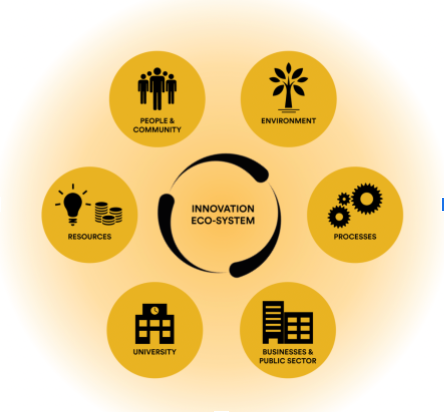A quick analysis of results and narratives from the first iteration of Knowledge Exchange Framework (KEF) fortifies the notion that smaller and specialist Higher Education Providers are a gateway to achieve the Government’s Levelling Up and Place Agenda.
The arguments to support and encourage the full diversity of institutions has been made several times in different contexts. Smaller and specialist higher education providers are embedded in parts of the country that are often overlooked in policymaking, outside of London and the South East or working with communities experiencing exclusion and poverty (see our previous blog).
Overall, several GuildHE members found in Cluster M (1), Cluster STEM(2) and Arts Cluster in KEF have done exceptionally well in the Local Growth and Regeneration category, especially those based in unique places around the country. Their KEF narratives give insight into the different pathways through which universities influence the local societies and economies positively by fostering new businesses, stimulating local job markets, and strengthening the small and medium enterprises (SMEs) in the region.
Taking Cornwall Global
Take the example of Falmouth University, the first and only University to be headquartered in Cornwall, including the Isles of Scilly.
Cornwall and Isle of Scilly was classified as the only ‘Less Developed Region’ in England for the EU structural funds in 2014-2020.
Falmouth University is amongst the top 10% of the sector for local growth and regeneration, significantly above the cluster average made up of other smaller universities with a teaching focus. Place is at the forefront of Falmouth’s Knowledge Exchange Policy and Strategy, with a clear recognition of its role in overcoming the local social and economical challenges by creating an ecosystem designed to retain talent, nurture creative tech start-ups and provide the region with high value jobs for the future.
A project initiated under this strategy by the name ‘Launchpad’ acts as both an incubator and an accelerator, and creates new high-growth tech companies. It starts with market-led challenges set by leading industry partners such as BBC Studios, Sony Interactive Entertainment and Amazon Web Services, against which teams develop high-growth startups around the solutions, creating knowledge based jobs as the business grows. So far, the first Launchpad cohort of 20 participants has created five incorporated companies, representing a 100% success of throughput. Three of these businesses have gone on to secure over £1.1m of investment.
Equine Therapy Centre at Hartpury University
Another GuildHE member in the Top 10% of the sector for Local Growth and Regeneration is Hartpury University located in rural Gloucestershire. Gloucestershire’s agriculture sector is valued at £1.5 billion, with 25,000 small and medium enterprises, and provides over 50,000 jobs.
Aligning to this context by delivering subject specialisms in agriculture, animal, equine, sport and veterinary nursing, Hartpury University aims to improve the local economies and regeneration of the County of Gloucestershire and the local areas of the Forest of Dean due to the associated challenges in these regions in relation to local economic development and social inclusion.
Amongst a suite of opportunities and projects offered through Hartpury’s Knowledge Exchange activities is The Equine Therapy Centre, the lead provider of hydrotherapy for horses and dogs in the South West. The centre has supported Olympic level athletes and teams. Hartpury has worked with academics from other equestrian programme providers, veterinary surgeons and hydrotherapy providers to develop guidelines for best practice in equine water treadmill use.
Supporting Regional Knowledge Growth through Higher Education Providers
Studies argue that the civic role of universities should be more focused in ‘left behind areas’ and on less economically and socially advantaged areas (See UPP Report on Levelling Up Towns). Smaller and specialist providers based in locations of economic significance and through the niche specialisms they operate in are imperative in overcoming regional disparities. This first iteration of the KEF provides strong, impartial evidence for these central roles they play in their local areas, often serving as a common hub for business and graduates, fostering innovation and driving creativity.
In the current landscape of changing ecosystems as a result of the Pandemic and Brexit, now is the time to properly invest in smaller and specialist universities so that they can continue to keep their regions afloat and drive wider socioeconomic recovery and sustainable growth. Increasing flexible funding options for innovation are needed to support transformative research and collaboration in overlooked local and regional clusters. Introducing core funding allocations for KE and innovation linked to participation in the KEF would be one way to do this.
Written by Haleema Masud, Policy Support Officer
1 Cluster M: Universities with academic activity across disciplines, particularly in other health and non STEM domains.
2. STEM cluster: Small institutions covering science, technology, mathematics and engineering. This cluster often has a high amount of excellent research particularly in bioscience, and veterinary and engineering.

